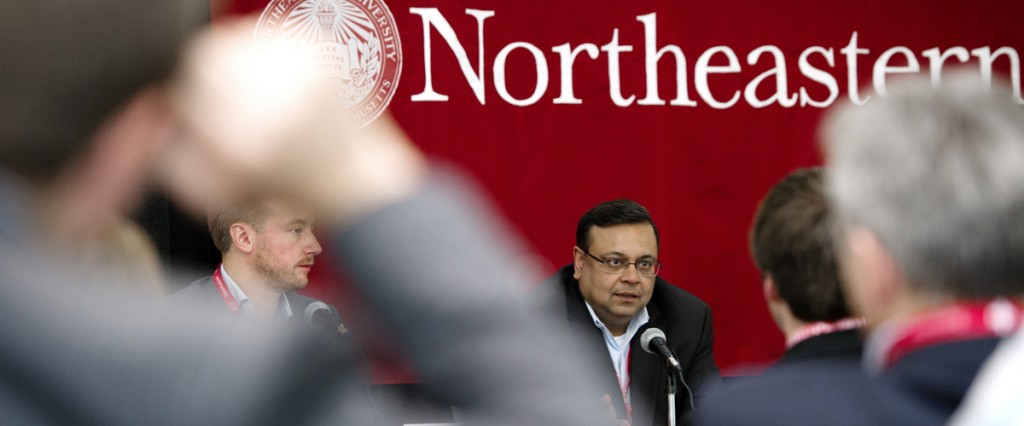by Greg St. Martin
Top researchers, entrepreneurs, scholars, and policymakers from Massachusetts and Switzerland convened at Northeastern University on Friday for an energy summit, where participants discussed innovations and strategies to address climate change and a range of other global energy challenges.
Experts—including a Swiss delegation of about 70 people—examined myriad topics including renewable energy conversion, data storage, green building, and global partnerships related to energy projects. Panel discussions expanded upon areas ranging from public sector energy research to bringing technology to market, while winners of the prestigious Watt d’Or award—given by the Swiss Federal Office of Energy in recognition of outstanding Swiss energy projects that offer a significant benefit for society—also presented their innovative projects.
Doris Leuthard, a Swiss Federal Councilor and head of Switzerland’s Department of the Environment, Transport, Energy and Communications, said in her keynote that as the global effects of climate change progress, the window is closing to address them.
“We have to get to important questions in the next decades,” Leuthard said. “What will our cities look like in 50 years? How we can produce and use energy with faster designs in the future for generations to come? These are global issues that can only be solved globally.”
Global efforts, she said, must be supplemented by national efforts that are tailored to the specific energy needs of different countries and cultures. The day’s discussions, she added, would help spark new energy innovations and strengthen collaborations between the U.S. and Switzerland.
Lino Guzzella, professor and president-elect of ETH Zurich, a distinguished Swiss research university that has earned three Watt d’Or awards, stressed the impact public-and private-sector investment in research can have on realizing climate change solutions. He noted, for example, that Albert Einstein in 1905 discovered the photoelectric effect, which is the basis for solar power and now 100 years later has led to a multi-billion industry. The technology, Guzzella said, may be one “that saves the Planet Earth.”
“Basic science,” he noted, “is the root of true progress,” adding that investment in science is an investment in the planet’s future.
The daylong seminar coincided with the public opening of an exhibit at Northeastern’s International Village featuring 25 energy innovations honored with the Watt d’Or award. The traveling exhibit, a dynamic blend of art and science, is making its world premiere at Northeastern and includes The Solar Impulse, a solar-powered airplane that flew for 26 consecutive hours. Other featured projects include a revolutionary yet elegant method for saving energy while showering and a fuel cell-powered vehicle called Pac Car II that set a world record in 2005 for energy-efficient driving.
Northeastern presented the events in partnership with the Swiss Federal Office of Energy and swissnex Boston, the consulate of Switzerland. The events dovetail with Northeastern’s longstanding community to use-inspired research in the area of sustainability, one of the university’s core research themes.
Stephen W. Director, provost and senior vice president for academic affairs, noted how Northeastern faculty are addressing sustainability challenges through interdisciplinary and innovative approaches. Professor Matthias Ruth, a leader in the emerging field of ecological economics, has shown that adopting proactive “green” policies is the most cost-effective way to sustain coastal cities against the long-term impact of climate change. Associate professor Carolyn Lee-Parsons is studying plant-based alternative energies, while professor Mark Patterson has developed autonomous underwater robots to monitor the ocean and measure the effects of climate change.
Director also noted the work of professor Sanjeev Mukerjee, who directs Northeastern University Center for Renewable Energy Technology. His lab’s work includes developing new fuel cells to replace internal combustion engines in cars.
Mukerjee participated in an afternoon panel discussion in which experts examined the different approaches to energy research in the U.S. and Switzerland and how they define how the energy pipeline will be filled. In response to a question about government support of basic and applied research, Mukerjee said a researcher begins with a “natural curiosity” about his field and must have a strong understanding of what barriers exist in that field. “Big barriers cannot be crossed with translational ideas. Translational ideas come when you know there’s a chance you can jump that big wall. Once you know you can jump it, that doesn’t mean it’ll become a product, a device, or a technology. But there’s a chance.”
He added, “As a researcher, the most important thing is to understand at a fundamental level how things work and be able to make that jump.”
The panel was also asked to identify the most urgent technological need for integrating renewables and energy efficiencies in the coming decades. Jennifer Rupp, a professor of materials science at ETH Zurich who is working on innovative tools for energy storage in batteries and energy conversion systems, said it’s critical to know the global accessibility of the elements needed to build batteries for energy storage technologies. Identifying alternative storage methods is just as important, she added.

